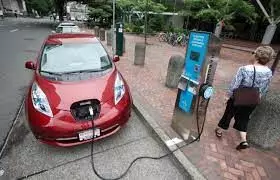EU decision on emission-free cars draws controversy in Germany

A move to make all new cars on European roads emission-free from 2035 onwards is running into opposition in Germany, both from key automotive sector and from the country's powerful environmental activists.
EU environment ministers hammered out a deal in the early hours of Wednesday after lengthy talks.
The talks were to the effect that no new cars with internal combustion engines might be sold in the bloc from 2035 onwards.
A clause in the deal opened the way for the possible use of e-fuels, or fuels that were deemed to be climate-friendly when used.
The deal must now be negotiated with the European Parliament before any change could take effect.
The VDA automotive association noted on Wednesday that there were insufficient charging points across Europe for electric cars.
The overnight decision by European Union (EU) environment ministers in Brussels was tantamount to a ban on vehicles with internal combustion engines from 2035, it said.
VDA president Hildegard Müller said that e-fuels – synthetic fuels made from captured carbon dioxide or monoxide had a major role to play in achieving global warming targets.
But she decried the fact that their use was not a critical component of the deal.
"As far as e-fuels are concerned, it seems that a mere declaration of intent had to suffice, the implementation of which remains open,'' she said.
The VDIK association of German vehicle importers called for rapid expansion of battery charging infrastructure.
It said that all technologies facilitating low-emission mobility should be used in Europe.
Meanwhile, environmental groups were critical of the EU ministers' decision e-fuel compromise.
"E-fuels are a sham solution.
"They are inefficient, not automatically carbon-neutral and will for the foreseeable future remain expensive and limited in availability,'' Antje von Broock, chief executive of the BUND nature conservation organisation, said.
"We would have liked to see a clear commitment to battery-powered electrics,'' Von Broock said.
Broock added that this would have generated a firmer basis for planning in the automotive sector.
She said, allowing cars with combustion engines after 2035 could only lead to misallocation of investment funding.
Martin Kaiser, deputy head of Greenpeace in Germany, said the EU ministers were building castles in the air and referred to a dilution of the aim to abandon the combustion engine.
"The fact that the EU is setting a clear final date for combustion engines with emissions was an important signal,'' he said.
"But this ban comes much too late to attain the 1.5-degree target in transport and to end Europe's dependence on oil.''
He criticised the EU for what he termed the "sham solution of inefficient and expensive e-fuels that have no place in the car market.''



